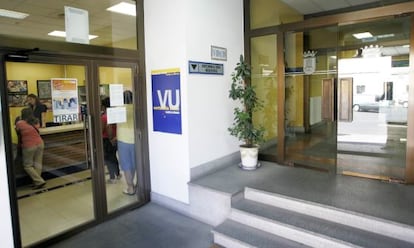Destitute couple says social services “snatched” their two children
The boys, aged 11 and two, are currently in a juvenile center in Toledo as parents face police complaint


A homeless couple, who claim that social workers took their two small children, are now facing charges of abandonment. The couple, a Spaniard and his Ukrainian partner, say that officials at Talavera town hall "snatched" the two boys, aged 11 and two, from them on Wednesday last week when they tried to meet with the mayor to explain their situation. They say they had spent two days fruitlessly going from the offices of one charity to another.
Ana Santamaría and Paloma Leis of the Social Services department in Talavera de la Reina, a town some 110 kilometers west of Madrid, accuse the couple of abandoning the two boys, and have filed a complaint with the police.
"From the moment they left them there, that's abandonment. This is not the way to deal with a situation when there are other routes for addressing such cases," says Leis. "Although in the end it'll be the judge who decides," she adds.
"From the moment they left them there, that's abandonment," say social services.
"I curse the moment that we went into the town hall," says Irina Tkachiv, aged 36. "All I want is to get my boys back," adds her partner Santos Manuel Calvo. "It's a lie that we just left them there. We went to try to get help; we wanted to talk to the mayor. Now we don't even know where the boys are."
Santamaría says the two boys are being held in a juvenile center, where they can stay for a maximum of six months. A judge will then decide whether the parents can retain custody, or if the court will assume that responsibility.
Tkachiv and Calvo say that they arrived in Talavera on Monday of last week to ask for financial help from the Red Cross, Catholic Church charity Cáritas, the town's social services department, and even the local Women's Institute.
They say that after failing to receive any help, they were eventually told to go to the Civil Guard station house, where they were sent to the town hall to explain their situation.
"When we got to the town hall, we were told that we should leave the children there, and that we should go - they virtually threw us out," says Tkachiv. "It was all over very quickly, in two minutes," adds Calvo.
"We did what we had to do: to put the children and their parents where they needed to be," says Santamaría, who would not comment further on the matter.
The couple then left Talavera, using the remaining money they had to take a bus to the nearby village of Torrijos, where Cáritas paid for them to stay in a hostel and gave them their fare to Madrid. "What else were we supposed to do? We had nowhere to stay. The matter was closed," says Calvo.
"I curse the moment that we went into the town hall," says Irina Tkachiv
The next day, in Madrid, Calvo was contacted by the police, who told him that he was being charged with abandoning his children.
Calvo, aged 52, has been unemployed since 2009. Until three months ago he was receiving an emergency unemployment payment of 426 euros a month after his social security benefit ran out. "They stopped paying me because I couldn't give them an address," he says. He and Tkachiv, who has no residency papers, were living in rented accommodation in the village of Cabezamesada, in Toledo province, until a year ago. His identity card still lists him as resident at this address. But for the last year he has been living in hostels. "We have never slept in the street or in a car," says Tkachiv.
The couple says that they have travelled around Spain in search of work. "I repaired window blinds, and was able to make enough to get by," says Calvo.
The couple's second child was born while the couple were on the road, in Tudela, in Navarra, almost two years ago. In June of this year, their car broke down in Santander, and they sought help from the social services.
"We went to Toledo, because that is where I was registered to vote," says Calvo. "We didn't want to ask for help until now, because we were afraid that the authorities would take our children away from us."
Martín Domenech, who works for Andalusia's social services, says that Calvo and Tkachiv should have asked their regional social services to take custody of their children. "The government can assume responsibility for minors for up to six months if the parents cite exceptional circumstances, such as a lack of economic resources," he says.
Transferring custody for a short period of time doesn't constitute abandonment or neglect, he says. "That occurs when there are risk indicators such as physical or emotional abuse. The problem is that parents in cases like these often don't know the proper steps to take."
José Manuel Ramírez, president of the Association of Directors and Managers of Spanish Social Services, says that regional and local governments have fewer resources to deal with what he says is a growing number of families close to destitution. "The government has reduced social emergency aid by 65 percent," he says.
Ramírez claims that the government's budget cuts will hurt people who are already struggling. "There are already too many families on the brink of social exclusion, and they're cutting the social services that are keeping them afloat," he says.
Poverty is on the rise in Spain, particularly among children. According to UNICEF and Save the Children, 27 percent of Spanish minors are affected. And if government aid continues to dwindle, says Ramírez, more and more families living on the breadline will be handing their children over to the authorities to look after.
In his 30 years of experience as a social worker, Ramírez says he's "never seen such dramatic cases" as those he has handled over the past two years. In the last few months, he has witnessed several instances of child abandonment. "A girl went to Murcia social services and left her baby at the reception table. She said she couldn't provide for her child and left," he says.
Even though regional governments are obliged to follow rules that provide for "immediate and guaranteed protection of minors," Ramírez believes that Calvo and Tkachiv's experience is evidence of a dangerous trend. He calculates that the 60 million euros cut from the government's emergency aid budget in the past two years has meant that 20,000 children in need of help have gone unattended. "And even if they do get aid, it arrives really late," he adds, taking up to eight months to arrive after it has been approved.
Since the Popular Party's secretary general, María Dolores Cospedal, took over as the head of the regional government of Castilla-La Mancha in 2011, she has slashed the budget for welfare benefits - including emergency aid - by 74 percent, dropping from 74 million euros 20 million euros.
Tkachiv and Calvo, whose case has attracted the attention of local TV stations, were due to meet with social services today. Their lawyer, José Ramón Felipe, says that the couple had no intention of abandoning their children, and had no other options.
Leis, of Talavera social services, insists that the couple did not seek help through the proper channels. "Our goal is to reunite families. Because there's nothing more heartbreaking than separating parents from their children."
Tu suscripción se está usando en otro dispositivo
¿Quieres añadir otro usuario a tu suscripción?
Si continúas leyendo en este dispositivo, no se podrá leer en el otro.
FlechaTu suscripción se está usando en otro dispositivo y solo puedes acceder a EL PAÍS desde un dispositivo a la vez.
Si quieres compartir tu cuenta, cambia tu suscripción a la modalidad Premium, así podrás añadir otro usuario. Cada uno accederá con su propia cuenta de email, lo que os permitirá personalizar vuestra experiencia en EL PAÍS.
¿Tienes una suscripción de empresa? Accede aquí para contratar más cuentas.
En el caso de no saber quién está usando tu cuenta, te recomendamos cambiar tu contraseña aquí.
Si decides continuar compartiendo tu cuenta, este mensaje se mostrará en tu dispositivo y en el de la otra persona que está usando tu cuenta de forma indefinida, afectando a tu experiencia de lectura. Puedes consultar aquí los términos y condiciones de la suscripción digital.








































